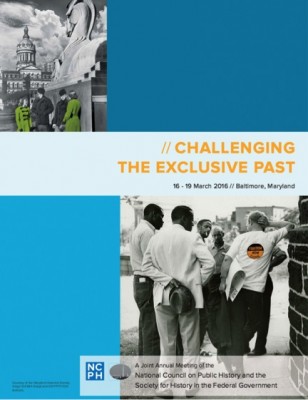Consultants and the NCPH annual meeting
16 March 2016 – David Benac
 This year’s conference promises to be one of the best in recent memory. The public history offerings in Baltimore are world class and offer plenty of temptations to draw us away from the conference. Consultants and attendees interested in consulting should find this year’s partnership with the Society for History in the Federal Government a particular draw. I am looking forward to learning more about the challenges and opportunities facing my colleagues in government.
This year’s conference promises to be one of the best in recent memory. The public history offerings in Baltimore are world class and offer plenty of temptations to draw us away from the conference. Consultants and attendees interested in consulting should find this year’s partnership with the Society for History in the Federal Government a particular draw. I am looking forward to learning more about the challenges and opportunities facing my colleagues in government.
A glance at a few of the events planned for the conference this year reveals the program committee’s close attention to diversity within the theme and the exceptional range of offerings of interest to consultants. As always, the range of experiences, from tours to working groups to posters to traditional panel presentations, offers a format for everyone. When I first saw “Challenging the Exclusive Past” as the theme, I was concerned that one exclusive past might be replaced by a new and improved exclusive past. This is not the case here: diversity is a guiding principle at all levels. Consultants will find relevant presentations on LGBT history, environmental justice, aging audiences, the politicization of practice, and administrative histories. We should all walk away energized and with some new ideas.
A counterpoint to the structured activities, the consultants reception is a perennial high point. This ticketed, but free and open, event on Thursday evening is a great way for new and veteran attendees to kick off their participation for the weekend. Each year the consultants committee organizes the reception as a key networking opportunity. At this informal event students and novices will find experienced consultants who are happy to share advice and offer some mentoring. By the end of the reception, with new and renewed acquaintances, everyone is ready to participate in the conference as part of the consultant community.
I look forward to seeing everyone in Baltimore.
~ David Benac is the Public History Coordinator at Western Michigan University where he teaches cultural resources management, environmental history, heritage tourism, and historic preservation. As a consultant he has written national register nominations, created digital interpretive tours, contributed to museum planning, and worked on Section 106 and NEPA assessments for wind farms, pipelines, and federal construction and demolition projects. He is also a member of the Kalamazoo Historic Preservation Commission.



